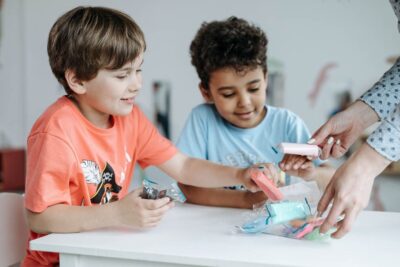Whether Helicopter, Snowplow, or Drone, Intensive Parenting Is Here to Stay
When we began our research on today’s independent school parents, we heard from heads of school that parents were more anxious than ever about their children’s futures, that they had become more transactional, and increasingly sought evidence of outcomes that the school could deliver for their children. Some heads cited examples of the overreach of helicopter parents, snowplow parents, and even drone parents; others wished that parents would slow down and focus more on their children’s education and well-being in the moment, instead of focusing on what is to come.
What many school leaders don’t realize is that these characteristics of today’s parents are manifestations of a parenting style that evolved over decades in the United States. Known as “intensive parenting” or “concerted cultivation,” it has become all too familiar to heads of school, administrators, faculty, and coaches at independent schools as this style of parenting has become the norm.
For heads of school, intensive parenting has resulted in changing parent expectations and greater demands, which often require more resources from the school to satisfy. Over time, this issue has only become more acute, which is why we’ve outlined here the key information that heads need to know about intensive parenting and how their institutions can respond.
What is intensive parenting?
Intensive parenting was first described in the 1990s by sociologists who observed that middle- and upper-class parents were investing a great deal in “cultivating” their children, as opposed to allowing for children’s “natural growth,” a style of child-rearing more prevalent among lower-income parents, and which had dominated American society in previous decades.
Intensive parenting is now the standard type of parenting across the socioeconomic spectrum as caregivers of all income levels are concerned about protecting their children against widening income inequality. This may account for why some researchers have posited that the ascendancy of intensive parenting in the United States is the result of parent anxiety about their children competing for future opportunities in education and the workplace.
Intensive parenting is centered around five core beliefs:
- Parenting is best done by mothers (though today’s fathers are also spending more time parenting their children)
- Raising children requires a significant time investment to meet their needs
- Parenting should be guided by the knowledge of experts
- Keeping kids physically and intellectually stimulated is costly
- Children are inherently good, precious, and vulnerable creatures
With these core beliefs in mind, the role of parents has shifted to become far more active and requires them to protect and invest in their children to carefully prepare them for a path of success in life. Indeed, it is commonplace for many of today’s parents to push their children to take the most challenging academic courses and engage in impressive extracurricular activities to provide what parents believe is the best chance of getting into a top-notch college and later being hired into a high-paying job.
At independent schools, heads have experienced many manifestations of these core beliefs of intensive parenting, with parents spending significantly more time engaged in their children’s lives and trying to play a role in influencing outcomes for their children’s future. As one head put it: “The reality is our kids are going to get into a great school, but they just don’t have control over what school that is. And it is that lack of control that leads our parents to madly scramble to look for any advantage they can get…A lot of it is panic: ‘I (as a parent) don’t know what’s going to make a difference, so I’m going to do anything and everything because I’m not sure which thing is going to become the thing that ruins my child’s life.'”
As a result, our partner schools have told us that they have invested significantly more time, energy, and resources into mitigating parent concerns. While today’s parenting style has much to do with the uncertainty and complexity that awaits students after graduation, independent schools must take additional steps to educate parents about what they have always been able to do: deliver expertise in developing well-rounded children who are prepared to take on the challenges of the world.
What are the effects of intensive parenting on children?
Though parental anxiety often reaches a fever pitch by upper school when children begin the college application process, it is not limited to the high school years. Indeed, parent anxiety is experienced in all grade levels. As the head of a K-8 school noted: “Parents are less likely to extend trust in the way that they used to in the past–they want evidence. They want detailed information to support conclusions that I think in the past would have been automatically given, like school is a safe place. Now, parents want to know about your security system. They bring a different layer of scrutiny to a school than I think has been present in the past.”
This scrutiny among parents has led to an increase in children’s physical well-being in our society. Research shows that parents can significantly impact their children’s health outcomes by modeling, monitoring, and encouraging certain behaviors, such as healthy eating, limited screen time, and the absence of alcohol or drug abuse. So while there are positive outcomes for children’s physical health that come with intensive parenting, research shows that it may also have “negative effects on children’s psychological well-being later in life, for example on college students’ locus of controls or depression levels.” Specifically, at college age, some studies indicate that children who were raised with intensive parenting show greater levels of anxiety and depression and lower levels of coping skills.
This may be the result of parents curtailing much of the freedom and autonomy with which they themselves were raised (e.g. walking to school on their own, dealing more independently with conflict or challenges at school) in order to protect their children’s safety or guide their children to make the “right” choice. A downside of this is that children may feel less confident in being able to handle obstacles on their own and may feel less competent overall.
As a result of concerns about student well-being starting at an early age, heads of school have told us about the greater investment they have made in school counselors, social-emotional education, and teaching parents about what to expect from their children at different stages of development. These efforts are being made to combat student mental health issues and promote wellness in a society in which being a child feels more stressful and complex than ever before.
A look ahead at EAB’s research on independent school parents
In our upcoming study on independent school parents, we will share with heads of school how they can deliberately identify and implement new ways of building trust and authority with parents in the face of their changing expectations of schools, while also establishing clear boundaries to maintain the integrity of their institutions. We look forward to sharing these strategies with our independent school partners in the coming months.
More Blogs

Building systems for principal success: 3 key lessons for district leadership

How education leaders can get good answers in the age of AI
